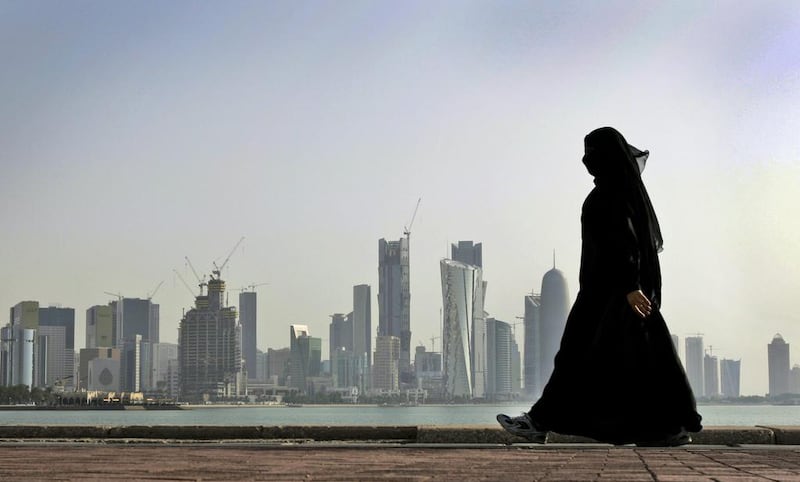Qatar resorting to the World Trade Organization (WTO) to settle a trade dispute with Arabian Gulf countries may drag on for years because of the complex process, lawyers said yesterday.
Qatar has raised a complaint against Saudi Arabia, the UAE and Bahrain with the WTO in response to the boycott the three countries have imposed on it.
Qatar's economy and commerce ministry said the complaint accuses the boycotting countries of violating the WTO's core laws and conventions on trade of goods and services, and trade-related aspects of intellectual property.
“The arbitrary measures taken...are a clear violation of the provisions and conventions of international trade law,” Sheikh Ahmed bin Jassem Al Thani, Qatar’s economy and commerce minister said.
The boycott “is unprecedented in the framework of economic blocs,” he said.
The UAE, Saudi Arabia, Bahrain and Egypt on June 5 broke diplomatic ties with Qatar and cut off air, sea and land access to the country over Doha’s support for “terrorist groups aiming to destabilise the region”. The dispute is the most serious between GCC members since the organisation’s creation in 1981. Egypt was not included in the complaint with the WTO.
Juma Al Kait, assistant undersecretary for foreign trade affairs at the Ministry of Economy, said yesterday that WTO member countries are within their rights to impose economic measures to meet their security needs, state-run news agency Wam reported.
___________________
Read more:
US sends retired general to diffuse Qatar dispute
Too many false flags flutter over Qatar
Qatar crisis: All you need to know
___________________
Sanctions imposed by the UAE, Saudi Arabia and Bahrain did not contradict the agreements of the WTO, and were in line with article 21 and article 14 of the General Agreement on Trade in Services (GATS), known as 'security exceptions', he said.
In its WTO complaint, the first step Qatar has taken is to request consultations under the WTO with its Gulf neighbours, a process that can last 60 days, after which Qatar can request a WTO panel to be composed to adjudicate the conflict.
“They [Qatar] tried to cover as many different agreements as possible [in the consultation request],” said Philippe De Baere, a Brussels-based trade lawyer with the law firm Van Bael & Bellis. “It is going to make legal proceedings much more complicated.” The complication also arises from the dispute settlement procedure under the WTO, which can last years.
“The [dispute] proceeding might take about two years and could result in the Gulf countries being told to stop the boycott,” said Edwin Vermulst, a partner with the law firm VVGB Advocaten and a Brussels-based trade lawyer. “If the Gulf countries would not do so, Qatar might then retaliate.”
There has been precedent to such disputes within the WTO, he added. Russia for example, has recently asked for consultations with Ukraine over its sanctions on Russian goods and services.
“This [dispute settlement process] is very much a diplomatic process as opposed to being a pure legal process. There are no damages awarded to the winning party,” said Mr De Baere. “For a country like Qatar which is quite small, it will be very difficult to find ways to retaliate.”
Gulf countries have argued that the measures they have taken are in compliance with article 21 of the General Agreement on Trade in Services, which allows WTO member states to take action against another state that threatens their security and stability.
"Article XXI has been invoked but has never led to a final report and there has been no decision on the precise scope of application of Article XXI," said Mr De Baere. "If the Gulf countries invoke the security exception then they will have to do it under each different agreement and the wording of the security exception in the various agreements is very similar but not identical."
The political and economic dispute is already taking a mounting toll on Qatar's economy, which is expected to slow this year as the stand-off enters into its second month.
Abu Dhabi Commercial Bank said that if the current sanctions against Qatar continue to the end of the year, Doha's non-oil economic growth could slow to as much as 3.6 per cent in 2017 from about 5.6 per cent last year.
The most visible impact on Qatar's economy so far has been a drop in the value of publicly traded companies on the stock exchange as well as a drop in tourism, an industry that is heavily dependent on custom from GCC visitors.
The benchmark Doha Securities Market index, a measure of Qatari stocks, dropped as much as 10 per cent after the move to isolate Qatar. On July 5, Moody's also downgraded Qatar's outlook to negative from stable, because of an increased probability that the dispute will not be resolved quickly.
Separately, the International Civil Aviation Organization (ICAO) has rejected a request by Qatar to condemn blockading countries.
UAE Minister of State for Foreign Affairs Anwar Gargash warned Qatar that it is pursuing a failed strategy with its repeated attempts to go to international bodies, rather than engage in regional talks.
In a tweet on Tuesday morning, Mr Gargash said that "Qatar’s failure in politicising the ICAO file is an early warning, and the catastrophic direction to politicise the Hajj will also fail".
He went on to say that "the solution lies in an honest revision (of Doha’s policies) after an accumulation of mistakes in the region and against (its) neighbours".
"Qatar’s strategy in dealing with its crisis is doomed for failure because it doesn’t deal with the roots of the crisis, that is supporting extremism and interference in the region to hurt its security and stability," he said.





